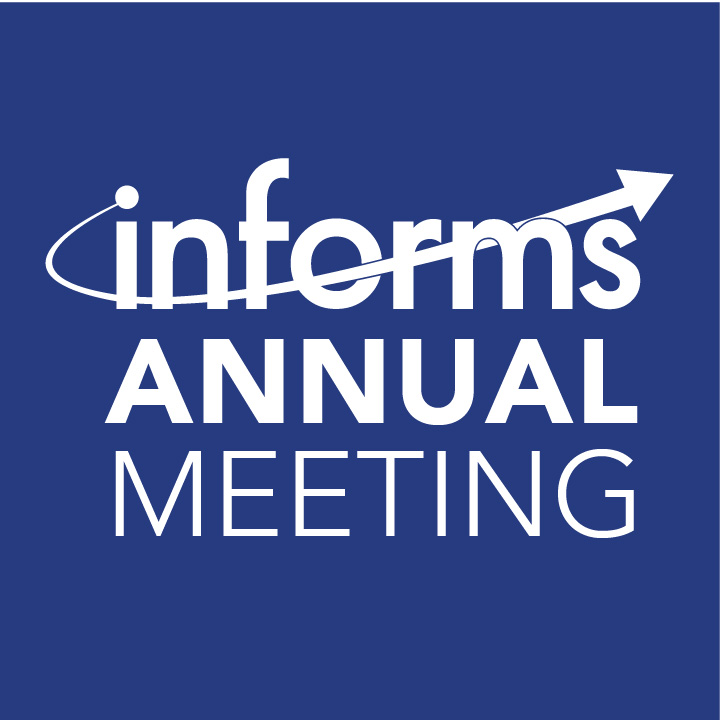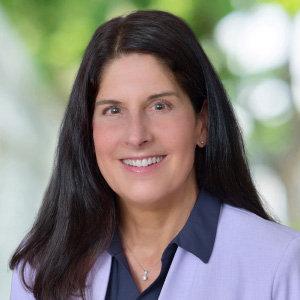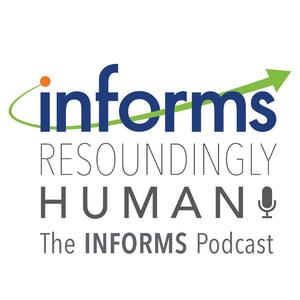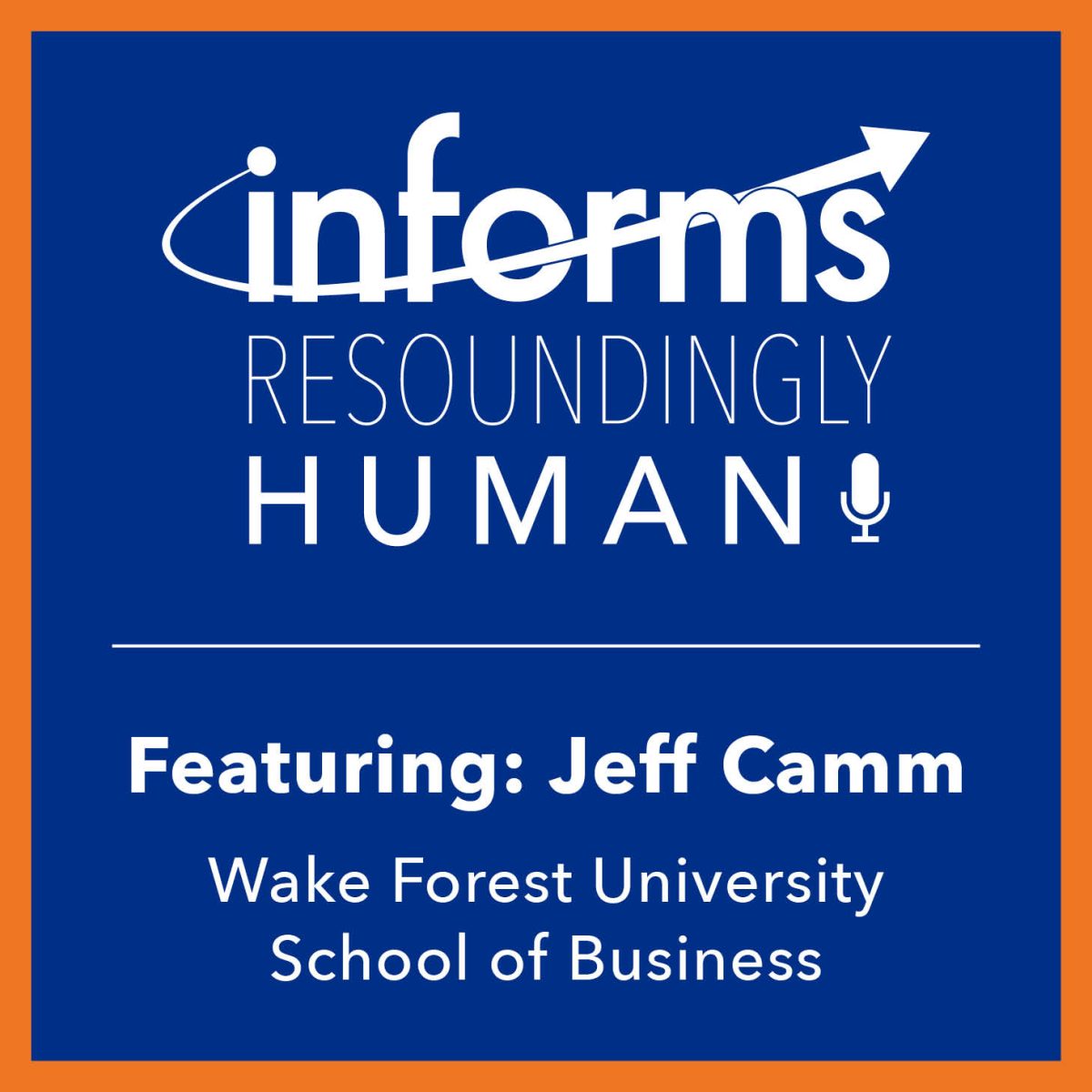Published: September 28, 2024

We’re in the countdown to the 2024 INFORMS Annual Meeting, in Seattle, Washington, October 20-23, when more than 6,000 INFORMS members, students, prospective employers and employees, and academic and industry experts will share the ways O.R. and analytics are fueling Smarter Decisions for a Better World.
Joining me to give a sneak peek of this year’s meeting is Ann Tracy, Colgate-Palmolive’s Chief Sustainability Officer. Ann leads Colgate’s Global Sustainable Strategy and Key Initiatives, integrating a strong technical foundation across their Enterprise Sustainability and Social Impact Strategy Core Ambition Pillars – driving social impact, helping millions of homes, and preserving our environment.
If you were to ask me though, 30 years ago, would I expect or aim to be in a role leading sustainability for a company, I wouldn’t have even known what that was at the time. It’s really kind of a new space if you will. Don’t quote me on the statistic, but something like in the last five years 40% of companies added their first Chief Sustainability Officer. So just to say it’s a relatively new role, but I’m grateful and privileged and pleased to be in this role. It’s a great way to kind of pull together everything I’ve learned and experienced at Colgate and really work on an important cause, an important mission which is to lower our impact while still driving business results.
Interviewed this episode:

Ann Tracy
Colgate-Palmolive
As Colgate-Palmolive’s Chief Sustainability Officer, Ann leads Colgate’s Global Sustainable Strategy and Key Initiatives, integrating a strong technical foundation across our Enterprise Sustainability and Social Impact Strategy Core Ambition Pillars – driving social impact, helping millions of homes and preserving our environment.
Ann holds a BA degree in Applied Science, a BS degree in Mechanical Engineering, and a Master’s of Engineering degree in Manufacturing Systems. Most recently, Ann has completed a Certificate of Sustainability from the University of Cambridge Institute for Sustainability Leadership. Currently, she is on the Board of the UNGC Network USA.
Related Episodes
Episode Transcript
Ann Tracy:
So if you were to ask me though, 30 years ago, would I expect or aim to be in a role leading sustainability for a company, I wouldn’t have even known what that was at the time. I mean, it’s really kind of a new space, if you will. Don’t quote me on this statistic, but something like in the last five years, 40% of companies added their first chief sustainability officer. So just to say it’s a relatively new role, new. But I’m grateful and privileged and pleased to be in this role. It’s a great way to kind of pull together everything that I’ve learned and experienced at Colgate and really work on an important cause and important mission, which is to lower our impact while still driving business results.
Ashley Kilgore:
Welcome to the latest episode of Resoundingly Human, the podcast brought to you by INFORMS, the leading association for professionals and students who apply science, math, technology, and analytics to make smarter decisions for a better world. I’m your host, Ashley K., and thank you for joining me to explore how INFORMS members are saving lives, saving money, and solving problems.
Welcome to the latest episode of Resoundingly Human, the podcast brought to you by INFORMS, the leading association for professionals and students who apply science, math, technology, and analytics to make smarter decisions for a better world. I’m your host, Ashley K., and thank you for joining me to explore how INFORMS members are saving lives, saving money, and solving problems. We’re in the countdown to the 2024 INFORMS annual meeting in Seattle, Washington, October 20th through the 23rd, when more than 6,000 INFORMS members, students, prospective employers, and employees and academic and industry experts will share the ways OR and analytics are fueling smarter decisions for a better world.
Joining me to give a sneak peek at this year’s meeting is Ann Tracy, Colgate-Palmolive’s chief sustainability officer. Ann leads Colgate’s global sustainable strategy and key initiatives, integrating a strong technical foundation across their enterprise, sustainability and social impact strategy core ambition pillars, driving social impact, helping millions of homes, and preserving our environment.
Ann, it’s so wonderful to speak with you and highlight both you and your presentation at the upcoming 2024 INFORMS annual meeting. Can you believe it is just right around the corner?
Ann Tracy:
No. This year flew by, Ashley, and I’m delighted to join you as well and look forward to the INFORMS event.
Ashley Kilgore:
Wonderful. So before we dive into what you’ll be presenting at this year’s meeting, I’d love to have you share a little about your own career in ORMS and analytics. How did you end up in this field?
Ann Tracy:
Yeah, so let me tell you about my career journey and why. Hopefully I can shed some light on how supply chain and sustainability come together. So I’ve been at Colgate a long time, and my career grew up in the supply chain at Colgate. So I have worked hands-on across the supply chain and if you will, from manufacturing at various levels of leadership within our supply chain, our operations and our plants, our manufacturing sites, and then onto leading supply chain for our divisions, our geographical business units, and then including customer service and logistics at the other end of the chain, more commercial facing. So across that spectrum over the years. And then about seven, eight years ago, I came into this space. I came back to our headquarters in New York to lead global supply chain strategy as well as our global sustainability strategy across the globe, across our enterprise.
And just to finish the story, fast-forward a bit, and we’re going to talk a lot more about sustainability today, but I’m sure if the audience has been following the evolution of climate change and in our case, plastic waste and some of these big imperatives that need to get tackled, there’s a lot of work to be done by the private sector. And as we set up these strategies, and we’ll talk about the intersections of supply chain and sustainability because there is a huge overlap there. But as we set up these strategies, and we developed what we call our sustainability and social impact strategy, we realized that there was a lot of work to be done just to move our enterprise sustainability work forward.
So at that point, I took over the sustainability strategy work and the supply chain strategy went to some other folks in the supply chain. And one final comment, when I first took on this role, I also had EHS and I was reporting into the supply chain. But then Colgate has evolved my role now to be more strategic commercial facing. So I now report into the head of growth and strategy. So here we are today.
Ashley Kilgore:
So Ann, I would love to have you share some additional insight into how supply chains are utilized at Colgate-Palmolive.
Ann Tracy:
Yeah. And in particular in the context of sustainability, which is what I’m going to be talking more about, I wanted to share that Colgate’s been doing this a very long time, actually. We’re obviously a consumer goods company, so us as well as our peers being consumer-facing, have been very much leaning into our impact on the environment, et cetera, for again, a long time. We’ve been measuring across our operations, our utilities, energy, electricity, waste to landfill, reduction of water, and our greenhouse gas emissions since 2002. So we’ve been measuring this over 20 years. So our environmental program really grew up in the supply chain. And I would have to say we count on every single function and business unit in the company to contribute toward our targets and achieving the actions that we’ve put forth in our sustainability and social impact strategy.
But the function, the global function that’s really kind of truly embedded and embraced, what we’re doing is most mature, I guess, in embracing it, is our supply chain. And that’s what we’ll talk more about. And that’s what more or less the focus of what I’m going to share is going to be going into.
Ashley Kilgore:
All right. So now speaking of your session at this year’s annual meeting, Re-imagining a Healthier Future With Sustainable Supply Chains, which will share unique insight into Colgate-Palmolive supply chains, and their focus on sustainability. Without giving too much away, could you share a sneak peek into what you’ll be discussing?
Ann Tracy:
Yeah, so I think I want to lay out our overarching strategy first and foremost, and you mentioned it earlier, our strategy is anchored in what we call three ambitions. One is driving social impact, one is helping millions of homes, and one is preserving our environment. And we have underneath those three ambitions, 11 actions and close to 50 targets. And just to dimensionalize those briefly, and I’ll share more about it when I’m at the INFORMS event, but driving social impact is around our own employees, helping them feel more inclusive and making sure we have a diverse environment. And then it’s also about the work we do in our communities and how we show up.
And then helping millions of homes is really more about our products and how we engage with consumers around the world, across all our categories, which by the way, and I’ll share this, but we have four core categories, oral care of course, but also personal care, home care, and pet care. And then preserving our environment. It’s where I’m going to spend most of my time because as I said, that work is highly dependent across all, if you will, sub-functions of the supply chain, from engineering, logistics, of course, our operations, manufacturing. Really heavily dependent on our procurement teams to get to achieve our targets and make our actions happen. So that’s what I’m going to spend a lot of time on, is more on that third ambition called preserving our environment.
Ashley Kilgore:
Well, I mean, it really sounds like supply chains play a significant role in Colgate-Palmolive’s sustainability work.
Ann Tracy:
Yeah. So delving a little further into it, double clicking into the preserving our environment. So we have, if you recall, we have 11 actions. Under preserving our environment, we have five actions focused on eliminating plastic waste, accelerating action on climate change, on lead with zero waste, which is really ultimately about keeping waste out of landfill, all waste that comes from Colgate and then promoting water stewardship. And a big one is to drive sustainable sourcing. So those five actions, and I’ll do a little bit of double click into those during the event. But just to preview, I mentioned that supply chain, and I use that term broadly, but there’s engineering, there’s logistics, there’s manufacturing, as we said, and procurement, that all really have embraced the work that needs to get done to reduce our scope three carbon emissions, to reduce and be aware of the water risk around the world, not just within our own supply chain, but in our value chain.
And to make sure that we’re not only conscious, but promoting and participating in what are the next steps to preserve and ensure water security. And we have a great program called True Zero Waste, which I’ll talk a little bit about. True, T-R-U-E, which is a program that evolved from the USGBT, and it’s a program. They developed LEED. And I think most people in the audience are familiar with LEED. They also developed this certification program, which is not easy to achieve, and our sites have really embraced it. And I’ll talk a little more about that.
And then the work we’re doing around water. If you stop to think about it, every one of our products requires water for use, so not only water in our products, water in our operations, but water to use our products. So water is a big topic for us as well. And then finally, one of our lead actions where we spend a lot of our time and resources is on eliminate plastic waste. So I’ll talk a bit about what we’re doing there and some of the tough challenges that we’re facing in our effort to try to manage our plastic use.
Ashley Kilgore:
So ultimately, what do you hope is the biggest takeaway or takeaways from your talk for attendees at this year’s meeting?
Ann Tracy:
Well, I think the takeaway should be anchored in both what are the challenges, where do we need help? And the fact that we can’t do this alone, we need a lot or partners, whether maybe I start with the partnership point, whether it’s working across industry. And we do that through our partnership with the Consumer Goods Forum. So we’re working with our peers, and in some cases suppliers. It takes partnership with, in certain cases, NGOs who are experts in these sustainability spaces. It takes partnerships with our retailers who we work with. It takes our employees embracing what we’re doing. And then it certainly takes, in many cases, we’re working with academics and academia on new technologies and to understand pathways forward. So that’s not an all-inclusive list, but a list of important partners that we have.
So what are the challenges that we face today? I think one that’s improving every day, but still a challenge is harnessing all the data that’s required to report against all of our targets, whether it’s climate data, emissions data, energy data, water data, et cetera. It’s still very manual. It’s getting better. There’s lots of new tools, lots of new platforms out there. We recently signed up with one called Watershed, which we think will tremendously help us in managing our net-zero roadmap and tackling scope three. And of course all that data, because of the pending regulations in Europe and eventually maybe the US, has to be more than ever robust. We have to have strict protocols in place. It has to be audit-ready, so that data is critical to the work we’re doing. That’s one, you could say, challenge area.
Another challenge area is just the sustainable finance transition. All of this is going to cost money. How do we do that in the most efficient way, in a way that drives impact, but also is business smart, if you will, and how do we account for all this? So that’s something that we’re tackling now with our finance teams. And then the third challenge, which I often talk about is some of this work, and these are broad challenges, by the way, which I can highlight more specifically across some of the actions that we’ll talk about related to supply chain. But a lot of this work requires, in some cases, new products and new behavior adoption by consumers. And sometimes that’s, you know, we developed the first recognized recyclable toothpaste tube. And that’s been a journey. It remains a journey. We haven’t widely spoken to consumers about it yet, and there’s reasons for that because we’re not ready to.
But when we are ready, just getting people to take their tube from their bathroom to their recycling bin may sound simple, but that’s a change in behavior. And we’re a consumer goods company, so it’s our job to understand the consumer. So there may be things that we develop that are better for the environment and may require consumer adoption in some form or fashion. We’ve all, many of us I think here have adopted to bringing our own bags to the grocery. That was a big change, but people are doing it now. So how do we make that happen?
Ashley Kilgore:
People can be a little slow to change, unfortunately. So Ann, I, for one, am so excited to hear your presentation. And to our listeners, if you want to hear more, you’ll just have to register for the conference. Ann, I’d love to change gears again and explore your career and interest more. If you weren’t in your current professional field, what do you think you’d be doing? Basically when you were a kid, what did you want to be when you grew up?
Ann Tracy:
Oh, I wanted to be an architect. No, I actually did right up until I started school. It’s a technical field. It kind of blends creativity and technical. But I pivoted to engineering because I think, where am I going with this? Engineering is such a great foundation for moving in any direction, and it certainly was a great foundation for the supply chain work that I did and eventually where I landed today. So if you were to ask me though, whatever, 30 years ago, would I expect or aim to be in a role leading sustainability for a company, I wouldn’t have even known what that was at the time. I mean, it’s really kind of a new space, if you will.
Don’t quote me on this statistic, but something like in the last five years, 40% of companies added their first chief sustainability officer. So just to say it’s a relatively new role, new. But I’m grateful and privileged and pleased to be in this role. It’s a wonderful way, having been at Colgate now 33 years, which is a long time, and I know everybody because I’ve been here so long, it’s a great way to kind of pull together everything that I’ve learned and experienced at Colgate and really work on an important cause and important mission, which is to lower our impact while still driving business results.
Ashley Kilgore:
Well, it definitely sounds like you are in the field you were meant to be in. So more about you. Do you have any hobbies or interests that are completely separate from the kind of work that you do?
Ann Tracy:
Yeah, I mean, I guess I don’t know if it’s completely separate, but I love the outdoors. So I do a lot of outdoor activities, whether it’s hiking, biking, so forth. I spend as much time as I can outdoors. I really believe in getting outside, getting into nature. And maybe that’s had some subconscious influence on why I am passionate about the work I do. So is that separate or not? I don’t know, but I spend a ton of time outside. And other than that, I’m very busy. I have four kids, three dogs and two cats. So that keeps us busy at home.
Ashley Kilgore:
Definitely. So Ann, what advice would you give to your younger self, either back when you were in school or just starting your career?
Ann Tracy:
It’s something I learned over time in my career and that I often give as advice to others, which I love to mentor younger people, which is, I know it sounds cliche, but it’s very true. Always keep learning. But when you get into a role, so if you look out ahead in your career, don’t always be thinking about just the next thing ahead of you, in front of you. But I encourage young people to identify, and it’s not always easy in the beginning, but identify key milestone roles five years, 10 years out. Give yourself a lofty target to aim for and then find your pathway there. And it’s not always a straight line, obviously. And then make it known. Aim for something high, make it known, travel in that direction. And then in terms of what’s right in front of you, every time you get into that next role, identify what is your fingerprint on that role. Identify a place where you can make a difference and focus on that. Focus is key.
Ashley Kilgore:
So the INFORMS tagline is, “Smarter decisions for a better world.” Could you share what does that mean to you in the work that you do?
Ann Tracy:
Smarter decisions for a better world? Well, I think it’s obvious that we all want a better world. And more and more, it’s becoming clearly evident that the world does not have an endless supply of resources. And as more and more people come on the earth, we have to be much more conscious of how we manage those resources. And obviously we have to make smarter decisions in order to do that. But private sector plays a huge role in balancing how we show up to all key stakeholders, how we make those decisions and those choices in a way. But at the same time, like I said, deliver the business because that’s key, that’s fundamental. We’re in business for a reason. So we want to be able to lower our impact, deliver our purpose, which in our case is to reimagine a healthier future for all people, their pets and our planet, while at the same time growing our business, which is important to all stakeholders.
Ashley Kilgore:
And finally, which of your accomplishments, either personal or professional, are you the most proud of?
Ann Tracy:
I think I would go back to more raising four kids that surprisingly are turning out okay. I think that’s ultimately what it’s all about. And I’m very proud of my professional career, but ultimately it’s for them. It’s why I do what I do. And again, very privileged and pleased to be in a role where I’m now able to hopefully drive some impact to make the world a better place, as we said, not just for them, but the next generation.
Ashley Kilgore:
And I want to thank you again so much for taking time to chat with me. And I, for one, can’t wait to see you in Seattle in just a few weeks.
Ann Tracy:
Uh-oh. Is it just a few weeks? Me too.
Ashley Kilgore:
If you’d like to learn more about today’s episode and guest, visit ResoundinglyHuman.com and check out our show notes. The podcast is also available for streaming and download on Amazon Music, Apple Podcasts, Google Podcasts, and Spotify. Wherever you listen, please be sure to leave a five-star review to help others find and enjoy the podcast. Until next time, I’m Ashley K. and this is Resoundingly Human.
Want to learn more? Check out the additional resources and links listed below for more information about what was discussed in the episode.
Tags: supplychain, sustainability



